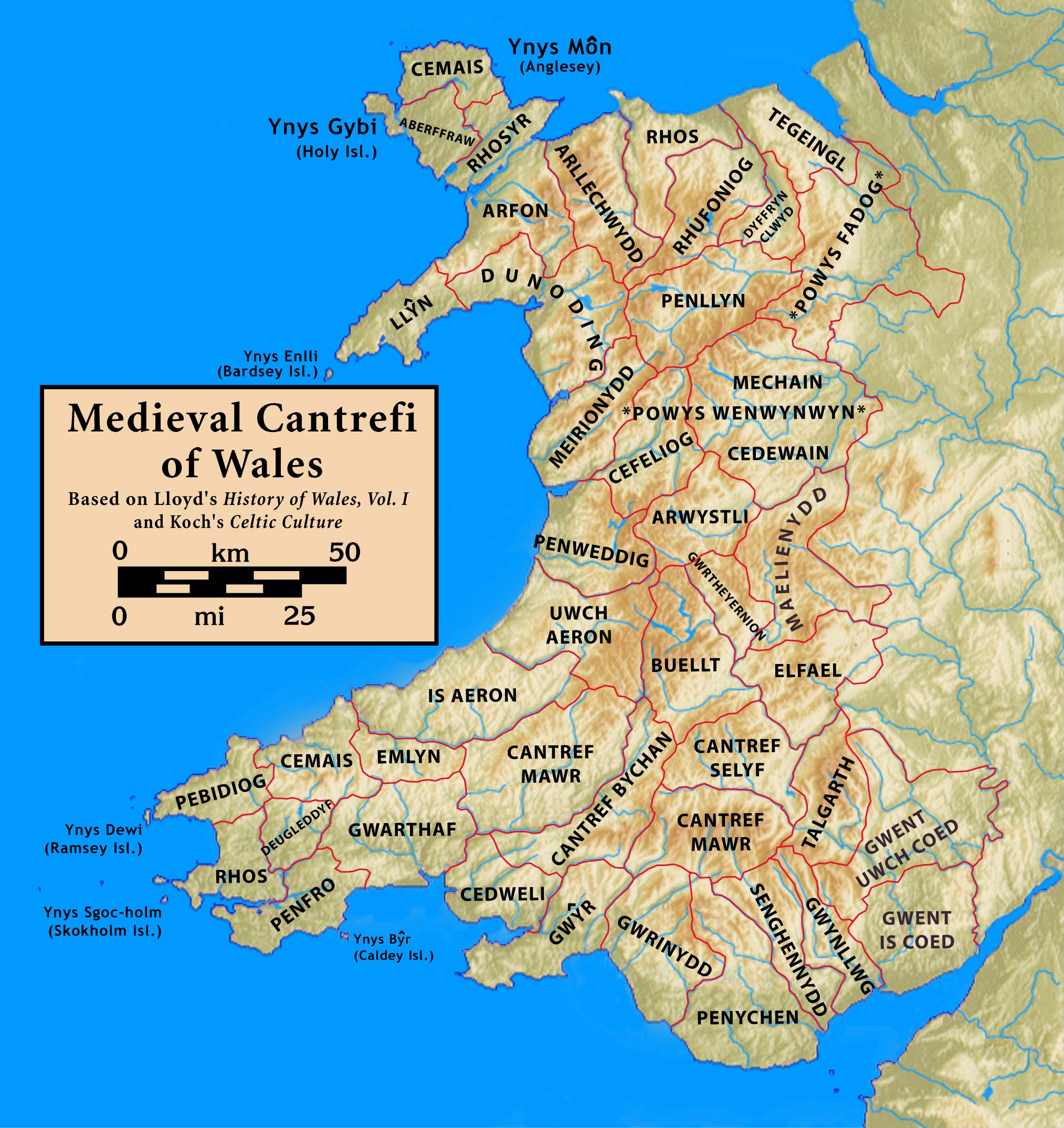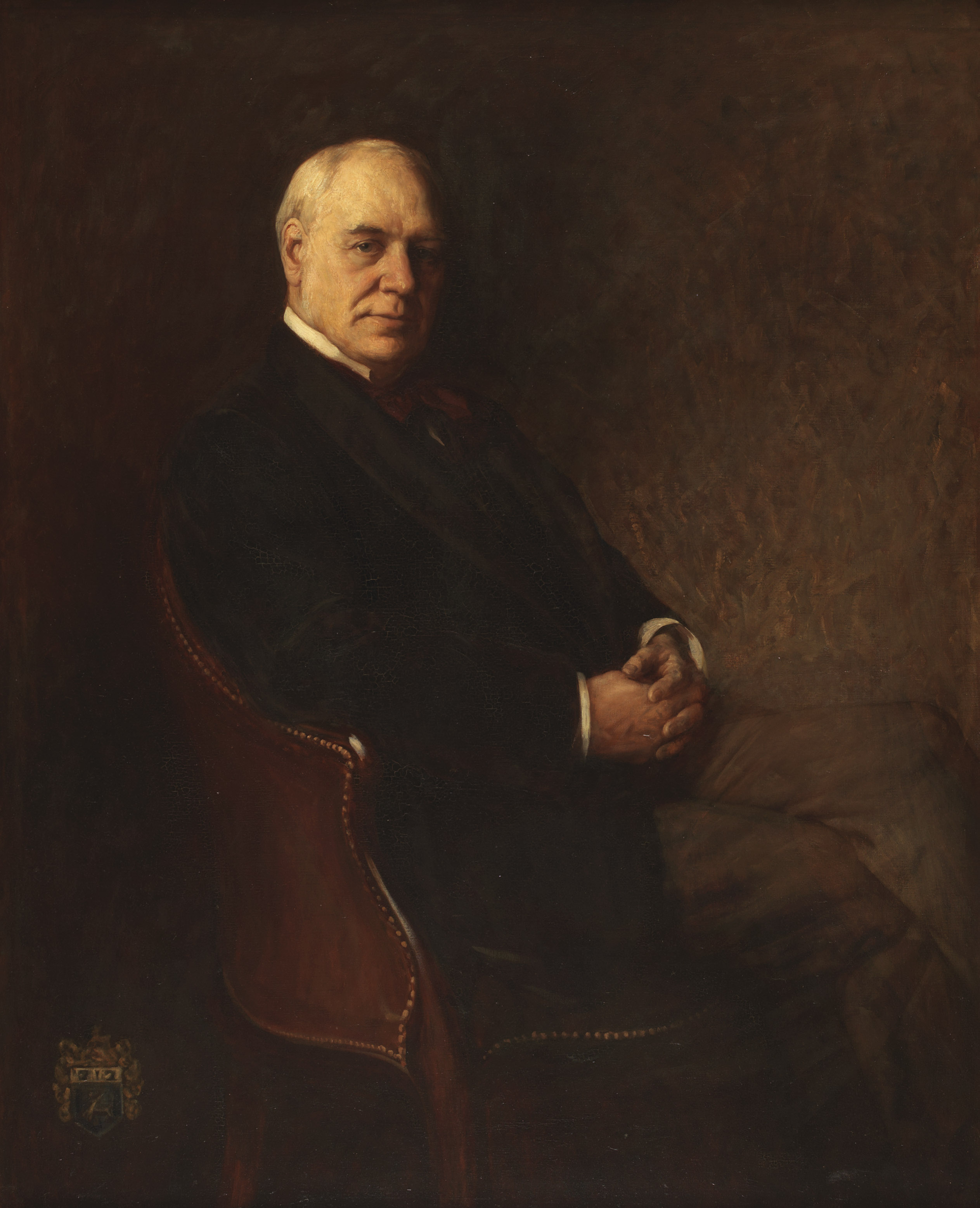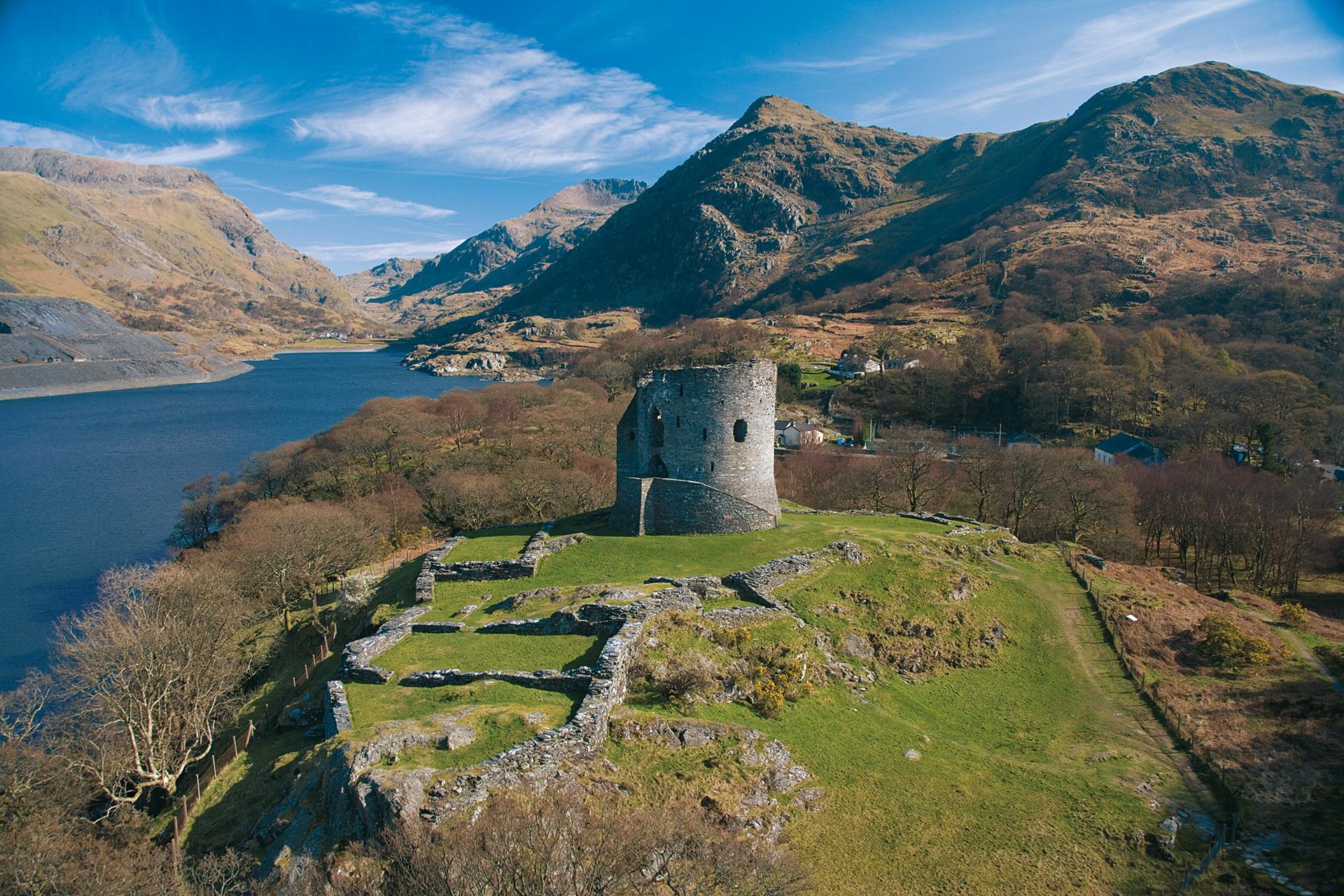|
Thomas Ap Rhodri
Tomas ap Rhodri or Thomas Rothery () was the only known son of Rhodri ap Gruffudd, the youngest son of Prince Gruffydd ap Llywelyn Fawr and younger brother to both Llywelyn ap Gruffudd and Dafydd ap Gruffydd. After the deaths of Llywelyn, Dafydd, and their eldest brother Owain the Red between 1282 and 1283, Rhodri became the most senior member of the Aberffraw Dynasty to retain his liberty because he had sold his rights of succession to his brother Llywelyn around 1270 before he had had any children of his own. Tomas did not make any claim himself to the throne of Gwynedd. Tomas was born in England sometime around 1300 and is thought to have died in 1363. His sister, Katherine, married into the former ruling family of Powys Wenwynwyn, now Earls of Powis. Tomas inherited his father's lands in Cheshire and Surrey (Tatfield). However, he parted from his Cheshire estates in favour of lands at Bidfield in Gloucestershire and Dinas in Mechain Is Coed (Powys). This is not the only ... [...More Info...] [...Related Items...] OR: [Wikipedia] [Google] [Baidu] |
Rhodri Ap Gruffudd
Rhodri ap Gruffudd (or Prince Rhodri or Roderick Fitz Griffin) (c. 1230 – c. 1315) was the third or fourth son of Gruffydd ap Llywelyn Fawr. He was the younger brother of both Llywelyn ap Gruffudd of Gwynedd, Prince of Wales) and of Owain Goch ap Gruffydd. He was probably the younger brother of Dafydd ap Gruffydd of Gwynedd but may have been the older as there are no accurate records of their birth dates. History Rhodri was born in the early 1230s. His father was Gruffydd ap Llywelyn, the illegitimate but eldest son of Llywelyn the Great, and his mother was Senena ferch Caradog. Little is known about his early life except that on his grandfather's death in 1240 his uncle Dafydd ap Llywelyn (his father's younger, but legitimate, half brother) inherited the throne and immediately imprisoned his father, thus disinheriting him. Gruffudd was subsequently relinquished by Dafydd under the terms of the Treaty of Gwerneigron following Henry III's invasion of 1241, and taken to Lon ... [...More Info...] [...Related Items...] OR: [Wikipedia] [Google] [Baidu] |
Mechain Is Coed
Mechain was a medieval cantref in the Kingdom of Powys. This cantref has also been referred to as Y Fyrnwy (''Vyrnwy''). Mechain may owe its name to the River Cain which flows through it on its way to join the River Vyrnwy; 'Me' or 'Mach' (c.f. Machynlleth, Mathrafal, etc., and in modern Welsh, field is ''maes'') may signify meadows or plain, in which case Mechain would mean "Meadows of the Cain". It corresponds to the later hundred of Llanfyllin. Mechain lay almost in the centre of the kingdom, bordering with the cantref of Caereinion to the south, the two commotes of the cantref of Mochnant to the north, and the commotes of Deuddwr and Ystrad Marchell in the cantref of Ystlyg to the east. It consisted of the commotes (''cymydau'') of Mechain Uwch Coed (''Mechain above the wood'') and Mechain Is Coed (''Mechain below the wood'') separated by the large wood or forest which stretched across the cantref around Bwlch-y-cibau. The caput of Mechain Uwch Coed was at Tomen yr Allt () ... [...More Info...] [...Related Items...] OR: [Wikipedia] [Google] [Baidu] |
Prince Of Wales
Prince of Wales ( cy, Tywysog Cymru, ; la, Princeps Cambriae/Walliae) is a title traditionally given to the heir apparent to the English and later British throne. Prior to the conquest by Edward I in the 13th century, it was used by the rulers of independent Wales. The first native Welsh prince was Gruffudd ap Cynan of Gwynedd, in 1137, although his son Owain Gwynedd (Owain ap Gruffudd) is often cited as having established the title. Llywelyn the Great is typically regarded as the strongest leader, holding power over the vast majority of Wales for 45 years. One of the last independent princes was Llywelyn ap Gruffydd (Llywelyn the Last), who was killed at the Battle of Orewin Bridge in 1282. His brother, Dafydd ap Gruffydd, was executed the following year. After these two deaths, Edward I of England invested his son Edward of Caernarfon as the first English prince of Wales in 1301. The title was later claimed by the heir of Gwynedd, Owain Glyndŵr (Owain ap Gruffydd), from ... [...More Info...] [...Related Items...] OR: [Wikipedia] [Google] [Baidu] |
Owain Lawgoch
Owain Lawgoch ( en, Owain of the Red Hand, french: Yvain de Galles), full name Owain ap Thomas ap Rhodri (July 1378), was a Welsh soldier who served in Lombardy, France, Alsace, and Switzerland. He led a Free Company fighting for the French against the English in the Hundred Years' War. As a politically active descendant of Llywelyn the Great in the male line, he was a claimant to the title of Prince of Gwynedd and of Wales. Genealogy Following the death of Llywelyn the Last in 1282 and the execution of his brother and successor Dafydd ap Gruffudd in 1283, Gwynedd paid fealty to and accepted English rule. Llywelyn's daughter Gwenllian ferch Llywelyn was committed to a nunnery at Sempringham, while the sons of Dafydd were kept in Bristol Castle until their deaths. Another of Llywelyn's brothers, Rhodri ap Gruffydd, renounced his rights in Gwynedd and spent much of his life in England as a royal pensioner. His son Thomas inherited lands in England in Surrey, Cheshire and Gloucest ... [...More Info...] [...Related Items...] OR: [Wikipedia] [Google] [Baidu] |
Dictionary Of Welsh Biography
The ''Dictionary of Welsh Biography'' (DWB) (also ''The Dictionary of Welsh Biography Down to 1940'' and ''The Dictionary of Welsh Biography, 1941 to 1970'') is a biographical dictionary of Welsh people who have made a significant contribution to Welsh life over seventeen centuries. It was first published in 1959, and is now maintained as a free online resource. Origins Robert Thomas Jenkins was assistant editor, then joint editor, of ' and its English-language counterpart, the ''Dictionary of Welsh Biography'', writing over 600 entries. His joint editor was John Edward Lloyd, but the ''Dictionary'' was not published until 1959, twelve years after his death. It is properly known as ''The Dictionary of Welsh Biography Down to 1940'', and its supplementary volume as ''The Dictionary of Welsh Biography, 1941 to 1970'' (2001). Originally published by the Honourable Society of Cymmrodorion, recent editions have been published by the University of Wales Press. ''The Dictionary of Wels ... [...More Info...] [...Related Items...] OR: [Wikipedia] [Google] [Baidu] |
National Library Of Wales
The National Library of Wales ( cy, Llyfrgell Genedlaethol Cymru), Aberystwyth, is the national legal deposit library of Wales and is one of the Welsh Government sponsored bodies. It is the biggest library in Wales, holding over 6.5 million books and periodicals, and the largest collections of archives, portraits, maps and photographic images in Wales. The Library is also home to the national collection of Welsh manuscripts, the National Screen and Sound Archive of Wales, and the most comprehensive collection of paintings and topographical prints in Wales. As the primary research library and archive in Wales and one of the largest research libraries in the United Kingdom, the National Library is a member of Research Libraries UK (RLUK) and the Consortium of European Research Libraries (CERL). At the very core of the National Library of Wales is the mission to collect and preserve materials related to Wales and Welsh life and those which can be utilised by the people of Wales fo ... [...More Info...] [...Related Items...] OR: [Wikipedia] [Google] [Baidu] |
Owain Goch
Owain ap Gruffudd (also known as ''Owain Goch'' wain the Red (died 1282) was brother to Llywelyn ap Gruffudd and Dafydd ap Gruffudd and, for a brief period in the late 1240s and early 1250s, ruler of part of the Kingdom of Gwynedd (in modern-day north Wales). Lineage Owain was the eldest son of Gruffudd ap Llywelyn and the grandson of Llywelyn the Great. He was imprisoned together with his father in Criccieth Castle in 1239 by his uncle Dafydd ap Llywelyn, and accompanied his father to England two years later when Dafydd was forced to hand Gruffudd over to King Henry III of England. In 1244 Gruffudd was killed when a makeshift rope broke as he attempted to escape from the Tower of London. This freed Dafydd ap Llywelyn's hand as King Henry could no longer use Gruffudd against him, and war broke out between him and King Henry in the spring of 1244. Owain meanwhile had been freed by Henry after his father's death in the hope that he would start a civil war in Gwynedd, but he rem ... [...More Info...] [...Related Items...] OR: [Wikipedia] [Google] [Baidu] |
Powys
Powys (; ) is a Local government in Wales#Principal areas, county and Preserved counties of Wales, preserved county in Wales. It is named after the Kingdom of Powys which was a Welsh succession of states, successor state, petty kingdom and principality that emerged during the Middle Ages following the end of Roman rule in Britain. Geography Powys covers the historic counties of Montgomeryshire and Radnorshire, most of Brecknockshire, and part of Denbighshire (historic), historic Denbighshire. With an area of about , it is now the largest administrative area in Wales by land and area (Dyfed was until 1996 before several Preserved counties of Wales, former counties created by the Local Government Act 1972 were abolished). It is bounded to the north by Gwynedd, Denbighshire and Wrexham County Borough; to the west by Ceredigion and Carmarthenshire; to the east by Shropshire and Herefordshire; and to the south by Rhondda Cynon Taf, Merthyr Tydfil County Borough, Caerphilly County Bor ... [...More Info...] [...Related Items...] OR: [Wikipedia] [Google] [Baidu] |
Gloucestershire
Gloucestershire ( abbreviated Glos) is a county in South West England. The county comprises part of the Cotswold Hills, part of the flat fertile valley of the River Severn and the entire Forest of Dean. The county town is the city of Gloucester and other principal towns and villages include Cheltenham, Cirencester, Kingswood, Bradley Stoke, Stroud, Thornbury, Yate, Tewkesbury, Bishop's Cleeve, Churchdown, Brockworth, Winchcombe, Dursley, Cam, Berkeley, Wotton-under-Edge, Tetbury, Moreton-in-Marsh, Fairford, Lechlade, Northleach, Stow-on-the-Wold, Chipping Campden, Bourton-on-the-Water, Stonehouse, Nailsworth, Minchinhampton, Painswick, Winterbourne, Frampton Cotterell, Coleford, Cinderford, Lydney and Rodborough and Cainscross that are within Stroud's urban area. Gloucestershire borders Herefordshire to the north-west, Worcestershire to the north, Warwickshire to the north-east, Oxfordshire to the east, Wiltshire to the south, Bristol and Somerset ... [...More Info...] [...Related Items...] OR: [Wikipedia] [Google] [Baidu] |
Gruffydd Ap Llywelyn Fawr
Gruffudd or Gruffydd ( or , in either case) is a Welsh name, originating in Old Welsh as a given name and today used as both a given and surname. It is the origin of the Anglicised name '' Griffith[s]'', and was historically sometimes treated as interchangeable with the etymologically unrelated Germanic name ''Galfrid'' ( Latinised as ''Galfridus''). The Welsh form evolved from the Common Brittonic ''Grippiud'' or ''Gripuid''.Morgan, T.J., Welsh Surnames, Qualitex Printing Limited, Cardiff, 1985, The ''Orthography of Welsh Surnames 5-8'', ''Gruffydd'' pgs 103–105, ''first element gruff as a noun means 'magic wand' and second element iudd as a noun means 'lord', found on page 160 entry for Maredudd'' Evolution and history One of the oldest forms which gave rise to all other variations is ''Grippiud'' or ''Gripuid'', which evolved into Old Welsh ''Griffudd''. The second element of the name, ''iudd'', as a noun has a meaning of 'lord' and is found in other Welsh names suc ... [...More Info...] [...Related Items...] OR: [Wikipedia] [Google] [Baidu] |




